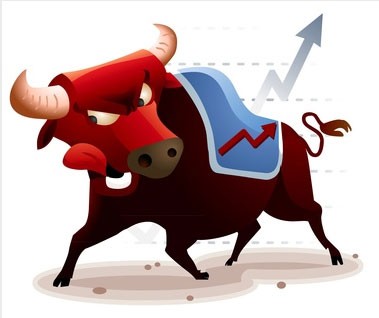Bull Market Definition
Post on: 27 Май, 2015 No Comment

Quite simply, bull markets refer to an upward trend in the stock market. The length of that uptrend determines whether it is a secular or cyclical bull market.
A secular bull market is characterized by above average stock market returns by the S&P 500 for a long time, typically 10 to 20 years. Periodic bear markets spring up within a secular bull market until the next cyclical bull market takes over and carries the market to even higher highs. A cyclical bull market refers to one that lasts a few months to a few years.
Many factors can drive bull markets: strong economy, high consumer spending, low unemployment, post-war spending, high stock valuations and earnings, and all-around optimism and certainty.
Bull Market Definition: Why is a Bull a Bull?
- Consistent rise in stock prices.
- Healthy economy.
- Geographic and political certainty.
For example, the U.S. stock market experienced a secular bull market from about 1983 to 2000 (or 2007), with brief upsets including the crash of 1987, and in the market collapse of 2000-2002 triggered by the dot-com bubble.
The technology sector drove the bull market from 1990-2000 and remains one of the longest and strongest ones in U.S. history. It was a time when triple-digit profits from start-up Internet stocks were the norm. Investors actually shied away from steady double-digit index performers (S&P 500, Dow Jones Industrials) to participate in the unprecedented run-up in technology stocks.
The second strongest bull market was brought on by election of Ronald Reagan in 1981, the descent of interest rates and the great bull market in bonds. From 1982 to 1987, the Dow Jones Industrial Index (DJI) gained 250%.
Interestingly, there is a lot of speculation surrounding the current uptrend in the stock market that started in 2009. Some say it is a cyclical bull market and is on the brink of a long-term trend reversal. Others say the last few years have been part of a bear market rally, and we may be coming into a new secular bull market.
Regardless of how it’s labeled, be sure you monitor the trends and performance of your positions. Don’t let emotions dictate what or when you buy or sell. Following the heard, a term referring to a piling up of money in stocks regardless of fundamentals, can be dangerous. When stock markets are wrought with excess and overvaluations, bear markets can often be right around the corner.














